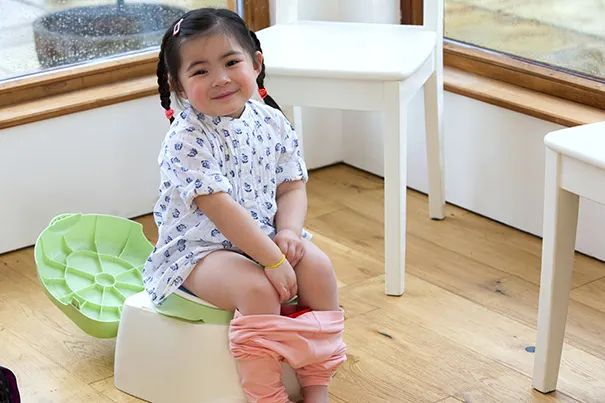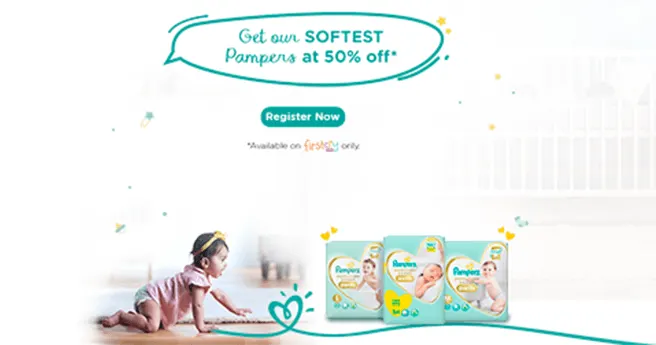Potty-training: Rewards for Potty-Training
Things were going so well on the potty-training front. But suddenly your child has stalled? – or, worse, regressed. Don't worry; it's completely normal for children to take their time or experience set-backs. Your job is to accept and support them no matter where they are in the process.
That said, you can encourage your child to move forward by offering some fun incentives. Here's how to motivate without pushing.
The Art of Rewards
Potty Helpers
Underwear and Overwear
The Art of Rewards
Rewards can be powerful tools when used correctly. But when used incorrectly they can backfire, shifting the emphasis entirely off potty-training and onto claiming the prize. Follow these guidelines to keep things on track:
Start with non-material rewards. Your affection and congratulations are the most coveted rewards of all. You should always offer praise or a hug each time your child attempts a step, like telling you when she's urinating, even if it's into her nappy. You can also celebrate small successes (like sitting on the potty, even if nothing materialises) with a phone call to a loved one. Some parents make up a special song or dance to perform each time their child 'performs'. Avoid overdoing it, however; you don't want to make the process overly important or place too much pressure on your child.
Keep material rewards small. Try rewarding your little one with a small treat each time he meets a goal. Go to the shops together and purchase small prizes: stickers, Matchbox cars, crayons. Place them in an out-of-reach but in-sight location so your child can keep his eye on the prize during visits to the potty. Hand out a reward only when he actually meets a goal; otherwise, you'll run through your gifts in a matter of hours!
Avoid purchasing large, expensive items. Luring your child with overwhelming gifts takes his focus off mastering a new skill and places it on getting the goods. And it sets him up to expect something huge each time he does what should come naturally. You want your child to use the potty because he has control of and confidence in his body, not because it's his ticket to a new toy.
Avoid offering edible treats - – sweets, ice cream, chips - – can be effective in the short term, however experts warn against using food as a reward. You don't want your child to begin to look at certain foods (e.g. sweets) as something he receives when he pleases you or does something 'good'. Kids this age are already asserting control over what goes into their body as well as what leaves it. It's best to tackle food issues separately, rather than bringing them into the potty-training arena.
Make the reward immediate. You're more likely to reinforce desired behaviour by rewarding your child straight away. Most young children don't have enough perspective to make the connection between the reward and the behaviour if the reward comes hours after they've met their goal. The younger the child, the more immediate the reward should be.
Potty Helpers
There are other effective ways to motivate your child besides rewards.
Try these parent-tested tactics:
Make the potty the best seat in the house. If you want your child to spend more time on the toilet, it should be a fun, comfortable place to hang out. Go shopping together for a new potty, such as one designed in his favourite colour or in a fun shape. – an animal or a car, for example. Or decorate the potty you already own with bright stickers. You can even write your child's name on the toilet in permanent marker. You might also stash some special books next to your child's potty to encourage him to stay a little longer
Wow with colour. Place a few drops of blue food colouring in the toilet bowl or potty chair. Show your child how adding yellow colouring – the same colour as his urine – changes the blue into green. Once your child witnesses the magic change in colour, he may be eager to make the colour change all by himself.
Use a potty partner. Going to the bathroom is much more fun when you've got company – such as a beloved stuffed animal, or a doll. Encourage your child to show his potty partner how to use the toilet: Once he helps his companion master the task, he might be more likely to follow suit.
Make target practice a blast. To entice your son to learn how to urinate standing up (and to up the odds that he'll aim into the bowl), make a game out of it: Drop several Cheerios or other O-shaped cereal pieces into the bowl for him to 'fire' at. You can also use paper targets. Create your own out of coloured tissue paper, or purchase specially made, flushable targets in different shapes.
Underwear and Overwear
Purchase some special 'big kid' underpants. Going from nappies to underwear is an exciting way for your child to feel grown-up. Even if he isn't quite ready for 'big kid' underwear, the experience of shopping for some is a step in the right direction. Once he's wearing a favourite pair he may be more motivated to keep them nice and dry. (Buy several pairs, since there are sure to be accidents.)
Dress your child in easy-to-remove clothing. If your child has to fuss with too many poppers, zips or buttons to use the potty, he may give up on the process. Try simplifying your child's wardrobe? – tracksuits or other trousers with elastic waistbands work well. During warm months, you may even want to let him run around without clothes. All he has to do is find his potty and sit!
If nothing you try makes a difference, your child is telling you he's not ready. In this case, the best thing to do is to back off and wait until he's physically and emotionally prepared to move forward again. Your patience and his readiness are the perfect combination.

